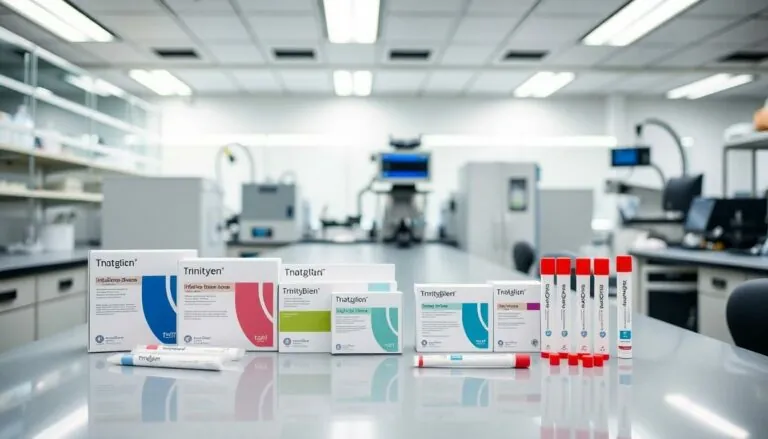Table of Contents
ToggleIn a world where science fiction is becoming reality, biotech hubs are the new playgrounds for innovation. These vibrant ecosystems are where brilliant minds come together to turn wild ideas into groundbreaking solutions. From gene editing to personalized medicine, the potential is limitless, and the excitement is palpable.
Imagine a place buzzing with creativity and ambition, where entrepreneurs, researchers, and investors mingle like they’re at a high-stakes cocktail party. It’s not just about the science; it’s about the magic that happens when passionate people collaborate. As they say, teamwork makes the dream work, especially when it involves CRISPR and lab coats!
Join the journey into the heart of these biotech hubs, where the future of health and technology is being crafted, one experiment at a time. Who knows? You might just find the next big breakthrough waiting around the corner.
Overview of Biotech Hubs
Biotech hubs emerge as critical ecosystems that drive innovation in life sciences. These centers promote collaboration among scientists, entrepreneurs, and investors. Many regions around the globe invest significantly in infrastructure support and funding mechanisms to foster biotech growth.
San Francisco and Boston lead as top biotech hubs due to their concentration of biotech firms and prominent research institutions. Notably, Cambridge, Massachusetts, home to numerous startups and leading universities, showcases the synergy between academia and industry. Research Triangle Park in North Carolina stands out for its collaborative environment, offering a robust talent pool from adjacent universities.
Many biotech hubs prioritize specific sectors, such as gene therapy or diagnostics. These local focuses allow for specialized advancements and attract targeted investments. Cities like Singapore and Shenzhen exemplify how international hubs can thrive by integrating global talent and resources.
Success stories arise regularly, illustrating the potential of these collaborative networks. For instance, companies based in prominent biotech hubs often outpace their competitors in product development and market entry.
Ultimately, biotech hubs create vibrant ecosystems characterized by shared knowledge and expertise. Their influence extends beyond local economies, impacting global health outcomes. Continuous advancements within these hubs indicate their growing importance in shaping the future of medicine and technology.
Key Characteristics of Successful Biotech Hubs

Successful biotech hubs thrive on collaborative innovation and resource availability. These centers exemplify how partnerships between various stakeholders drive breakthroughs.
Innovation Ecosystems
Innovation ecosystems define the core of thriving biotech hubs. Collaboration among researchers, entrepreneurs, and regulatory bodies enhances creativity and accelerates discovery. Hubs often feature incubators and accelerators that provide essential support to startups. Networking events and conferences promote knowledge exchange and attract diverse talent. Universities and research institutions play crucial roles, offering cutting-edge research and a steady pipeline of skilled professionals. Engaging with global networks fosters the sharing of best practices, driving continuous improvement within these ecosystems. Consequently, environments rich in collaboration lead to groundbreaking advancements in healthcare and biomanufacturing.
Funding and Investment
Funding and investment create the backbone of biotech hubs’ success. Access to capital fuels innovation, allowing startups to scale and advance research. Venture capital firms focus on biotech, identifying promising projects and supporting their growth. Public-private partnerships often bridge funding gaps, enhancing projects with governmental support. Grants from institutions can further supplement initial investments, enabling research initiatives. The presence of angel investors also plays a vital role, providing early-stage funding to nurture ideas. Regions with strong financial support systems consistently attract top talent and innovative companies, fostering a competitive landscape. This dynamic environment ensures that promising technologies move seamlessly from concept to market.
Leading Biotech Hubs Around the World
Biotech hubs around the globe play a pivotal role in advancing life sciences. These regions foster innovation through collaboration among scientists, entrepreneurs, and investors.
Silicon Valley, California
Silicon Valley stands as a premier leader in biotech innovation. Its rich ecosystem supports numerous startups and established firms, contributing to breakthroughs in therapies and diagnostics. Access to top-tier research institutions enhances partnerships between academia and industry. Funding from venture capital firms fuels ambitious projects. Networking opportunities abound, enabling professionals to exchange ideas. The region’s culture of risk-taking propels new technologies into the market swiftly.
Boston, Massachusetts
Boston ranks among the most influential biotech hubs. Home to world-renowned universities, such as Harvard and MIT, it provides a strong foundation for research and development. The presence of major pharmaceutical companies attracts investment and talent. Knowledge-sharing is common due to active collaboration between academia and industry. Clusters of biotech firms create a competitive atmosphere, driving rapid advancements. This environment fosters innovation across various sectors, including genomics and therapeutics.
Cambridge, UK
Cambridge represents a vibrant biotech hub in Europe. Its proximity to universities and research centers encourages synergy between scholars and entrepreneurs. Numerous biotech firms flourish in this landscape, benefiting from local expertise. Government initiatives and funding programs support innovation and growth. Collaborative ventures foster exploration of cutting-edge technologies. The city also attracts international talent, enhancing its reputation in the global market.
Challenges Faced by Biotech Hubs
Biotech hubs encounter various challenges that can impede their growth and innovation potential. Key areas of concern include regulatory hurdles and talent acquisition.
Regulatory Hurdles
Regulatory hurdles often slow down the advancement of biotech innovations. Compliance with complex regulations demands significant time and resources, which can divert focus from research initiatives. Navigating the approval processes for new therapies or technologies presents a daunting challenge for many startups. Biotech firms must maintain constant communication with regulatory agencies to ensure compliance. Additionally, changing policies can create uncertainty, leading to delays in product development timelines.
Talent Acquisition
Talent acquisition stands as another pressing issue for biotech hubs. Skilled professionals are in high demand, and competition for top talent remains fierce. Many biotech companies look for individuals with specialized expertise, making the hiring process challenging. Geographic location can also play a role; hubs that offer a robust network of resources and a collaborative environment tend to attract talent more effectively. Companies often invest heavily in employee development and retention strategies to mitigate high turnover rates in this competitive landscape.
Future Trends in Biotech Hubs
Emerging technologies are shaping the future of biotech hubs, driving innovation and attracting investment. Artificial intelligence plays a crucial role in drug discovery and development, streamlining processes and enhancing efficiency. Notably, machine learning algorithms help researchers analyze vast datasets, identifying promising candidates faster than traditional methods.
Sustainability trends increase emphasis on eco-friendly practices within biotech. Many hubs prioritize clean technology in production processes, addressing environmental concerns while fostering innovation. Collaboration with green tech firms leads to groundbreaking advancements in biomanufacturing.
Additionally, personalized medicine gains traction, shifting focus towards patient-specific solutions. Regions specializing in genomics and advanced therapeutics attract companies aiming to tailor treatments for individual patients. Global regulatory frameworks evolve to accommodate these innovations, providing clearer pathways for approval.
Data-driven decision-making becomes integral for startups in biotech hubs. Utilizing analytics tools allows firms to measure performance and identify market trends. Consequently, businesses can pivot quickly in response to emerging opportunities.
Investment in biotechnology education is also a vital trend. Universities and institutions enhance programs to equip students with skills relevant to current industry needs. This focus on education nurtures a well-prepared talent pool, addressing the pressing challenge of talent acquisition.
Finally, international collaboration continues to expand, connecting regional hubs across borders. Partnerships between biotech firms in different countries promote knowledge exchange and resource sharing, accelerating progress in life sciences. As these trends unfold, biotech hubs evolve, positioning themselves as epicenters of innovation and growth in healthcare.
Biotech hubs are shaping the future of healthcare and technology through their collaborative ecosystems. By fostering innovation and attracting diverse talent, these regions are not just enhancing local economies but also making significant global contributions. The integration of cutting-edge technologies and sustainable practices positions them as leaders in the life sciences field.
As the landscape evolves, the continued focus on personalized medicine and data-driven approaches will further propel these hubs into new realms of discovery. The synergy between academia, industry, and investment is vital for overcoming challenges and unlocking the full potential of biotechnology. With their dynamic environments, biotech hubs are set to remain at the forefront of groundbreaking advancements for years to come.






